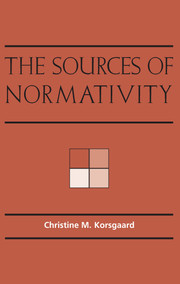Book contents
- Frontmatter
- Contents
- Notes on the contributors
- Acknowledgments
- Introduction
- Prologue: Excellence and obligation a very concise history of western metaphysics 387 bc to 1887 ad
- 1 The normative question
- 2 Reflective endorsement
- 3 The authority of reflection
- 4 The origin of value and the scope of obligation
- 5 Reason, humanity, and the moral law
- 6 Morality and identity
- 7 Universality and the reflective self
- 8 History, morality, and the test of reflection
- 9 Reply
- Bibliography
- Index
Introduction
Published online by Cambridge University Press: 20 May 2010
- Frontmatter
- Contents
- Notes on the contributors
- Acknowledgments
- Introduction
- Prologue: Excellence and obligation a very concise history of western metaphysics 387 bc to 1887 ad
- 1 The normative question
- 2 Reflective endorsement
- 3 The authority of reflection
- 4 The origin of value and the scope of obligation
- 5 Reason, humanity, and the moral law
- 6 Morality and identity
- 7 Universality and the reflective self
- 8 History, morality, and the test of reflection
- 9 Reply
- Bibliography
- Index
Summary
Normativity pervades our lives. We not merely have beliefs: we claim that we and others ought to hold certain beliefs. We not merely have desires: we claim that we and others ought to act on some of them, but not on others. We assume that what somebody believes or does may be judged reasonable or unreasonable, right or wrong, good or bad, that it is answerable to standards or norms. So far, so commonplace; but we have only to go a little further to find ourselves on the high seas of moral philosophy.
We will find ourselves at sea because there is huge disagreement about the source and the authority of norms on which we all constantly rely. The Tanner Lectures provide an outstanding opportunity to address and discuss such fundamental ethical questions. Thanks to the generous support of the Tanner Trustees, Tanner Lectures on Human Values are given at a total of eight different universities each year. The 1992 Tanner Lectures in Cambridge were given by Christine Korsgaard. Her lectures were followed by comments by G. A. Cohen, Raymond Geuss, Thomas Nagel, and Bernard Williams, and by extended and moughtful discussion by a large audience. Thanks to the President and Fellows of Clare Hall, the occasion was congenial as well as invigorating. Since then texts have been exchanged, revised and refined and Christine Korsgaard has added a reply to her commentators.
- Type
- Chapter
- Information
- The Sources of Normativity , pp. xi - xviPublisher: Cambridge University PressPrint publication year: 1996
- 14
- Cited by



